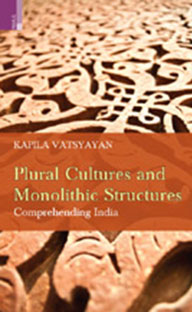
Plural Cultures and Monolithic Structures: Comprehending India
AUTHOR- Kapila Vatsyayan
| HB ₹850. $59.95 . ₤39.95 |
||
INFORMATION
- AUTHOR : Kapila Vatsyayan
- ISBN : 978-93-80607-45-0
- Year : 2013
- Extent : xiv + 232
- Discount available on checkout
- Usually dispatched within 3 to 5 working days.
Plural Cultures and Monolithic Structures
| HB ₹ 850 . $ . ₤ |
PB ₹ . $ . ₤ |
|
| POD ₹ . $ . ₤ |
e-Book ₹ . $ . ₤ |
INFORMATION
- AUTHOR – Kapila Vatsyayan
- ISBN – 978-93-80607-45-0
- Year – 2013
- Extent: 400 + 40 coloured illustrations
- 10% discount + free shipping
- Usually dispatched within 3 to 5 working days.
The essays in this volume raise a set of highly pertinent questions with regard to comprehending the complex issues that arise when plural cultures meet the monolithic structures of administration and policy that accompany the aspirations of the nation state. How does the nation state with its commitment to the quantifiable collectives of caste, religion, community, and even culture, respond to the fluid and multiple matrixes of region, history, social identity, ritual, and language in India? The essays explore the problems that arise when shifting cultural categories are juxtaposed against the more rigidly constructed categories created by the institutions of the state. The issues enlarged upon here are those that the author has often discussed, including the interconnectedness of the arts and the integration of body, mind and senses in the Indian artistic traditions.
The Author
Dr Kapila Vatsyayan is acknowledged nationally and internationally for her unstinting dedication to nurturing the arts and creating bridges of communication between the diverse cultural traditions of India. She has carried forward the legacy of the pioneers, principally Kamaladevi Chattopadhyaya, who gave dignity and prestige to the creativity of the traditional arts and crafts. She has taken the concerns of the inclusion of art education to international forums, specially as a member of the UNESCO Executive Board. Dr Vatsyayan has been associated with the establishment of institutions in pre-independent India and has continued to do so over half a century. In her capacity as Adviser to the Government of India, she has been responsible for the setting up of several institutions, including the Centre for Cultural Resources and Training in New Delhi, the Central Institute of Higher Tibetan Studies in Sarnath, and many others.
Dr Vatsyayan is the author of nearly 20 books and recipient of many awards, notably the Sankaradeva Award for national integration, the Rajiv Gandhi Sadbhavana Award, and the Life-time Achievement Award from the Sahitya Kala Parishad of the Government of NCT of Delhi. She is a Fellow of the Sangeet Natak Akademi and the Lalit Kala Akademi; and former Vice-Chairman of the Sangeet Natak Akademi.
The essays in this volume raise a set of highly pertinent questions with regard to comprehending the complex issues that arise when plural cultures meet the monolithic structures of administration and policy that accompany the aspirations of the nation state. How does the nation state with its commitment to the quantifiable collectives of caste, religion, community, and even culture, respond to the fluid and multiple matrixes of region, history, social identity, ritual, and language in India? The essays explore the problems that arise when shifting cultural categories are juxtaposed against the more rigidly constructed categories created by the institutions of the state. The issues enlarged upon here are those that the author has often discussed, including the interconnectedness of the arts and the integration of body, mind and senses in the Indian artistic traditions.
The Author
Dr Kapila Vatsyayan is acknowledged nationally and internationally for her unstinting dedication to nurturing the arts and creating bridges of communication between the diverse cultural traditions of India. She has carried forward the legacy of the pioneers, principally Kamaladevi Chattopadhyaya, who gave dignity and prestige to the creativity of the traditional arts and crafts. She has taken the concerns of the inclusion of art education to international forums, specially as a member of the UNESCO Executive Board. Dr Vatsyayan has been associated with the establishment of institutions in pre-independent India and has continued to do so over half a century. In her capacity as Adviser to the Government of India, she has been responsible for the setting up of several institutions, including the Centre for Cultural Resources and Training in New Delhi, the Central Institute of Higher Tibetan Studies in Sarnath, and many others.
Dr Vatsyayan is the author of nearly 20 books and recipient of many awards, notably the Sankaradeva Award for national integration, the Rajiv Gandhi Sadbhavana Award, and the Life-time Achievement Award from the Sahitya Kala Parishad of the Government of NCT of Delhi. She is a Fellow of the Sangeet Natak Akademi and the Lalit Kala Akademi; and former Vice-Chairman of the Sangeet Natak Akademi.





